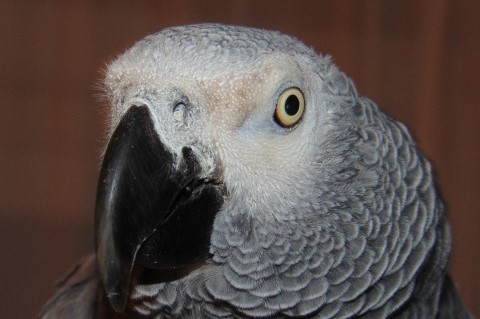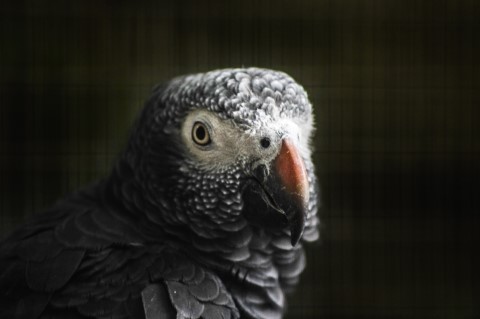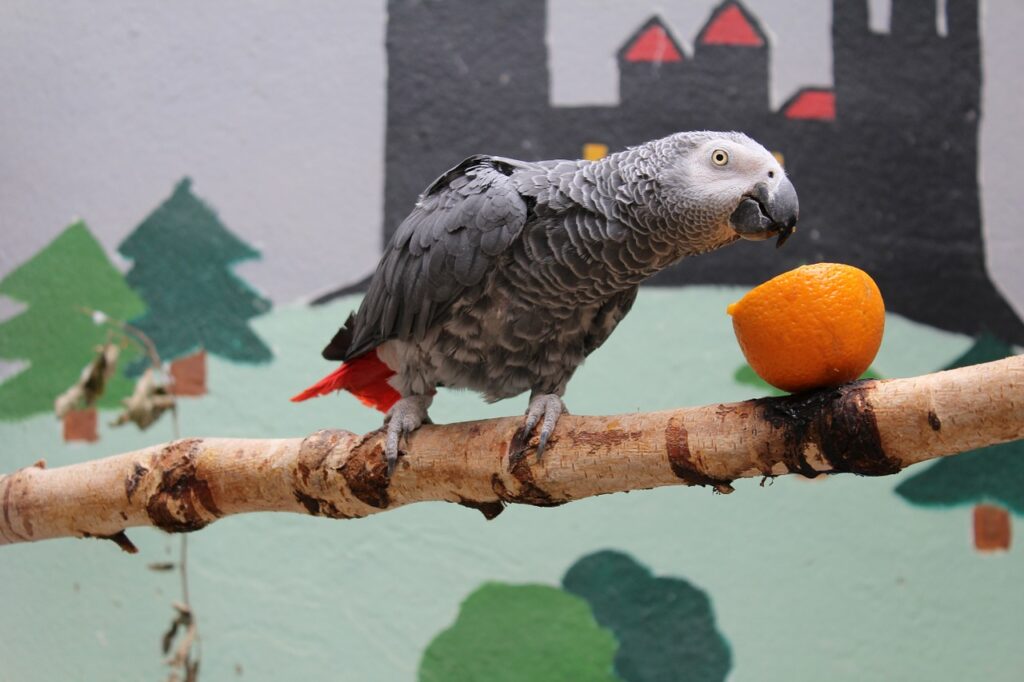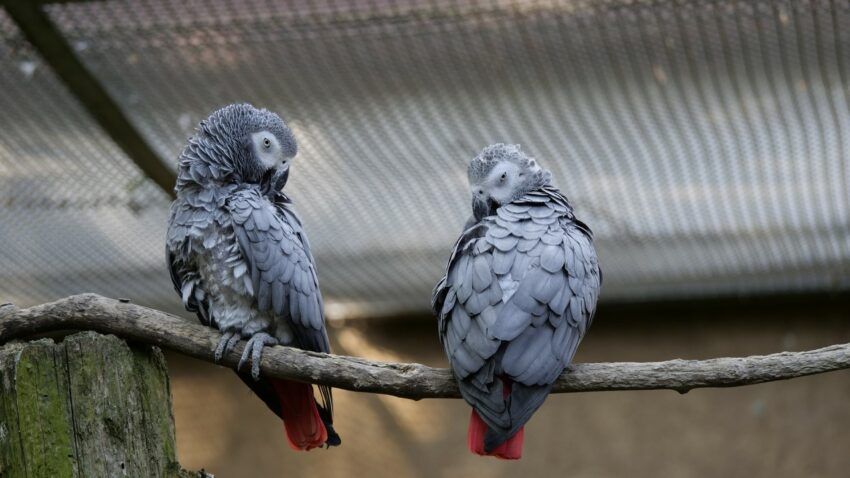Want to know more about one of the most talented and intelligent creatures in the animal kingdom? Here is some basic information about the African grey parrot.
- What Is An African Grey Parrot?
- What Is The Difference Between The Congo And Timneh?
- Mimicry – Look Who's Talking
- About The African Grey Parrot's Habitat
- African Grey Parrot Lifespan
- What Do African Grey Parrots Eat?
- Mr And Mrs Grey
- Conservation Of The African Grey Parrot
- African Grey Intelligence – This Birdbrain Is Smart
- Famous African Grey Parrots
- About The African Grey Parrot As A Pet – A Demanding Commitment
- Want To Know More About The African Grey Parrot?
What Is An African Grey Parrot?
African grey refers to two kinds of medium-sized grey parrots with red tails that are native to Central and West Africa. They are the Congo African grey (CAG) and the Timneh African grey (TAG).
Until recently, the Timneh was classified as a sub-species of the grey parrot. However, since 2012 the Timneh has been classified as a species on its own.
For those who care about such things, the scientific name of the Congo African grey is Psittacus erithacus, and for the Timneh it is Psittacus timneh.
African grey parrots have the ability to mimic human speech. They are highly intelligent, and are prized companion pets.
What Is The Difference Between The Congo And Timneh?
There are several differences.. To begin with, the Congo is a little longer and larger than the Timneh.
For me, the easiest way to tell that a parrot is a Congo African grey is by the coloring of its beak. That’s because it is black, whereas the Timneh has a lighter, horn-colored patch on its upper beak.
The feathers of the Timneh are dark, almost charcoal grey, compared to the lighter grey of the Congo.
The Timneh’s tail feathers are maroon-colored. The Congo’s tail is bright red.
| Congo African Grey | Timneh African Grey | |
|---|---|---|
| Beak Color |  |  |
| Body length | 30 to 40 cm (12 to 16 inches) | 23 to 28 cm (9 to 11 inches) |
| Body Weight | 400 to 650 g (0.8 to 1.4 lb) | 250 to 375 g (0.6 to 0.8 lb) |
Mimicry – Look Who’s Talking
The African grey is famous for its outstanding ability to reproduce sounds that it picks up from its environment.
More impressive is its ability to mimic human speech. The Congo grey speaks in the voice of the human that it is copying. However, the Timneh speaks in its own voice.
African greys are even capable of singing.
There are numerous examples on television, online media, and elsewhere, of African greys demonstrating vocabularies of several hundred words, and the ability to replicate almost any sound.
About The African Grey Parrot’s Habitat
The African grey is native to equatorial Africa. The Congo grey lives in large areas of central Africa ranging from the west coast and reaching countries like Uganda and Kenya in the east.
The Timneh occupies a much smaller area, ranging from Guinea-Bissau and reaching as far as the Ivory Coast in the south.
There is almost no overlap between the habitats of the two species.
African Grey Parrot Lifespan
The lifespan of the African grey parrot in captivity is in the range of 40 to 60 years. Some sources even suggest that a life expectancy of 80 years is possible.
In the wild, the life expectancy of the bird is dramatically lower at around 23 years.
What Do African Grey Parrots Eat?

The African grey’s natural diet consists mostly of fruits, nuts and seeds. It will also eat certain flowers, the bark of trees, snails and insects. It has a preference for the fruit of the oil palm.
In captivity, it can feed on most raw fruit and vegetables found in the average household. It can also eat pellets, various seeds, nuts and some human foods.
Elsewhere on this website you can find our comprehensive list of safe foods for parrots, complete with nutritional information for most foods.
Certain human foods, like avocado, are toxic to parrots.
Mr And Mrs Grey
African grey parrots are sexually dimorphic. This means that there are differences in the outer appearance of males and females.
The differences between genders are very subtle. Therefore, it is difficult to identify a bird’s gender unless you compare the male and female directly to each other.
You can’t use this method to establish the sex of young birds. That is because physical variations between genders only appear from the age of about 18 months.
Reliable ways to determine the gender of captive birds are through surgical examination, or by DNA testing.
In the wild, African greys nest in tree cavities. Usually, only one pair occupies a single tree. They frequently take over holes abandoned by other birds such as woodpeckers.
The hen lays between 3 to 5 eggs. She is fed by the male while she incubates the eggs, and both parents feed and care for the chicks after they hatch.
Conservation Of The African Grey Parrot
Although greys have a few natural enemies, humans pose the greatest threat to them. Deforestation, and the trapping of birds for the international pet trade has caused their numbers to decline sharply.
Estimates of population sizes in the wild vary widely. These range from several hundred thousand birds to more than 10 million. However, there is no doubt that their numbers are shrinking.
It is estimated that in Ghana, the population of African grey parrots has been decimated by as much as 99%.
The International Union for the Conservation of Nature (IUCN) has classified the African grey parrot as ‘endangered’ (EN). This ia a negative change from the previous ‘vulnerable’ (VU) classification. This means that there is a very high risk of extinction in the wild.
The Convention on the International Trade of Endangered Fauna and Flora (CITES) afforded African grey parrots the highest level of protection by listing them under Appendix I. Because of this, the international trade of wild African grey parrots has been banned since 2017.
This ban does not affect the commercial trade of captive-bred grey parrots.
African Grey Intelligence – This Birdbrain Is Smart
For a long time, many who have owned, or have observed African greys over time, have believed that they possess high levels of natural intelligence.
It was not until Dr. Irene Pepperberg shared the results of her research with an African grey parrot called Alex, that scientific evidence emerged to support such beliefs.
Dr Pepperberg showed that Alex was able to understand simple verbal instructions. He could also correctly identify characteristics of various objects according to their number, color, shape, size and material composition.
Alex died unexpectedly in 2007, but Pepperberg has managed to replicate her results with several other African greys. since then.
African grey parrots have the cognitive and reasoning abilities of a 3 year old human child.
Famous African Grey Parrots
No article about the African grey parrot would be complete without mentioning grey parrots that have achieved fame by showcasing their intelligence and talents.
Einstein
Einstein is probably the best-known parrot mimic. She achieved fame after appearing on TED in 2006. She was trained by her keepers at Knoxville Zoo in Tennessee, and had a repertoire of around 200 words and sounds.
Prudle
Prudle won the title of ‘Best Talking Parrot-Like Bird’ at the National Cage and Aviary Bird Show in London for 12 years in a row, between 1965 and 1976. She had a vocabulary of around 800 words. She retired undefeated.
Based on these achievements, Prudle is recognized by the Guinness Book of Records as ‘Best Talking Bird’.
Alex
Alex became the subject of Dr. Irene Pepperberg’s ground-breaking research into animal cognition and became famous after Dr. Pepperberg wrote about and demonstrated her findings.
N’kisi
N’kisi has an impressive vocabulary of over 900 words. He was supposedly able to recognize Jane Goodall, the celebrated chimpanzee researcher, after only having seen her in a photograph. Upon their first meeting he asked her “Got a chimp?”
N’kisi is also claimed to have telepathic abilities.
To test this, a study was devised wherein he and his owner, Aimee Morgana, were placed in separate rooms and recorded using synchronized video cameras. Aimee was shown several photographs which she studied for 2 minutes at a time.
In the other room, N’kisi’s utterings were recorded and analysed for keywords relating to the pictures shown to Aimee.
In this study, N’kisi’s score was almost twice what would normally be attributed to chance. However, the scientific community has treated this study with skepticism.
About The African Grey Parrot As A Pet – A Demanding Commitment
African grey parrots are intelligent, playful and social animals. As a result, they demand frequent and stimulating interaction with their owners. Without it, they can become bored and depressed. This can lead to the development of destructive and aggressive behaviors.
To stay healthy, they require clean living areas and space that allows them to be physically active. They also need a diet that is varied and nutritious. That means that they need to feed on fruit and vegetables daily, in addition to seeds.
Caring for an African grey requires a lot of time of its owner, and a constant awareness of the bird’s needs.
Owing to its long life expectancy and its tendency to bond with a single person, caring for an African grey parrot must be a long-term commitment.
Want To Know More About The African Grey Parrot?
Please feel free to explore this website. Whether you are a prospective African grey owner or you already own a grey you are very likely to find what you are looking for here.
We are continuously adding new articles, guides and information about African grey parrots. If you don’t find what you are looking for right away, come back regularly.
Alternatively, leave a comment to let us know how we can help. We’ll do our best to accommodate you.

I love this post. I don’t do much research on animals, but reading this post was fascinating. This is such a gorgeous bird. I loved learning about the different parrots and their vocabulary. It shows just how intelligent they can be.
Thank you Jodi. I can’t begin to tell you just how amazing and rewarding it can be to listen to and interact with a healthy, well adjusted African grey.
I love the African Grey Parrot,we use to have one as a pet when we were child,will never forget.He use to say “good morning” every day or close the door man”, It the best pet for big family. They are so smart, fan and bring life and happiness every day. What’s done to protect them? I hope through your articles people learn about them. They are wonderful and precious, thank you for this article.
Hi Mathene. You’re welcome. Yes, I hope that my website will help to create awareness about the plight of wild African greys.
Another aim of this site is to help people understand what they need to do to ensure that their African grey lives a healthy and happy life.
It’s the least that we can do for them in return for the pleasure that they bring into our lives.
I really enjoyed this article on african grey parrots. Though I’ve never owned a parrot, my parents had a mynah bird for many years. It had an amazing vocabulary, though some words were a bit rude lol! How amazing that the african grey is so intelligent, and that Prudle had such a huge vocabulary of 800 words. I’m sure this breed of parrot would make a great pet, but would need a lot of attention. How sad that 99% of african greys have disappeared from Ghana.
Glad to hear that you enjoyed it Kathy. Yes, their disappearance from the wild is sad. If you ever come across anyone expressing interest in buying an African grey, draw their attention to the problem and ask them to ensure that they buy a captive-bred grey and not one caught in the wild.
Thank you for this post on African Greys! My neighbour has one and they are super fun to listen to, especially when they “mimicry” to practically everything they hear. I have 5 parrots of my own, and they make lots of noise and mimicry too, but not as much as an African Grey can.
You’re welcome Andrea. Nice to meet a fellow parrot owner. I would love to know what kinds of parrots you own.
I really enjoyed and learned so much about the African Grey Parrot I never knew, and in fact, I have never heard of this parrot until reading your article. You have given me the craving to want one of these for my very own, you see I love animals but I have never had a pet bird and this one really has gotten my attention
Thanks for sharing,
Jeff
Thank you Jeff. So glad that I could share something that you enjoyed. If you do decide to get one, please research carefully and make sure that you are doing the right thing and that that you are prepared to dedicate the time and effort required. I plan to do several articles in forthcoming weeks that will help people to decide if African grey ownership is right for them. Keep your eyes peeled for them :).
Dear Frank
Thank you very much for your fantastic website. It is amazing that you show people where to start and what steps to take towards looking after their favourite pets. I hope more people will know about your website and follow your guidance.
Kind regards,
Andrey
Thank you Andrey. I really appreciate your comments.
I have seen this bird at the local pet store. But never knew it was called the African Grey Parrot. It is really beautiful.
Thank you for all the information about it. I found it very interesting. And also sad when I read that it is facing extinction. I mean, 99% of the population gone! Very sad. So many animals in our world are facing extinctions too. And I am very sad to hear it is happening to this fine species.
On the other hand, it was wonderful to hear that they are living longer lives as pets. Does this mean that most of the African Grey Parrots are now bred in captivity? With longer life spans, can we help them have more babies? And in effect, save them from extinction?
Thank you Timotheus. It’s only in Ghana where 99% of the population has disappeared. Fortunately, African greys also exist in other African countries where the impact of illegal trade in greys is not as severe as in Ghana, but is still bad enough for the populations in those countries to be threatened too.
To answer your question, I don’t know whether more African greys are bred in captivity than in the wild. I think it is safe to say that in countries where laws designed to stop the illegal trade of endangered animals are being enforced, like the US and much of Europe for example, most of the African greys sold in those countries would have been bred in captivity and this would reduce the demand for illegal wild-caught birds. This would have the effect of allowing the wild populations to stabilize and grow again.
Great post, very well written, easy to read, very informative. I knew they were highly intelligent I didn’t realize there numbers have been decimated to the risk of extinction, so sad for such a beautiful creature
Thank you for your feedback Butch. Promoting awareness of the threat to African greys in the wild, and encouraging responsible ownership can only help their predicament.
I saw a video whete these birds were doing some amazing tasks. It was unbelievable to see how smart they are. The degree of difficulty was higher with each new task, but they were unstoppable. Thanks for sharing this article. Great site!
Hi Ivan. Yes, they really are amazing creatures. Thank you so much for your comments and feedback. Feel free to visit again soon 🙂
Very nice article. Lots of information for people who are intersting for parrots. Very articulate and clear. I really enjoyed it. Keep up the good work.
Thank you for your feedback Dimitra. Glad you enjoyed the article.
I’ll do my best to keep providing useful info for people interested in parrots.
What’s an interesting article! I remember having a family pet African grey parrot as a kid, and this is told me some fascinating facts about them.
For example, I would never have known that avocado was toxic to parrots due to the persin in them as you said in your other article, because they can eat so many fruits.
It’s a shame that these beautiful and intelligent creatures are at a high risk of extinction, and as usual because of humans. Considering that the percentage is now so low in Ghana, does that mean that the Timneh African Grey Parrot is at a higher risk?
Thank you for sharing this, there’s a lot to learn here, for sure.
Kind regards,
James
Thank you James. Glad that I was able to help you learn something new about African greys.
Are you asking whether the Timneh is at a higher risk because its habitat borders Ghana? No, probably not. Although African greys are being illegally captured throughout their habitat, Ghana’s rate of population decline is most likely a result of the implementation of controls and preventative measures being the weakest in that country compared to others.
Thank you for this great post. Now we know more about the African Grey and its sub-species the Congo African grey and the Timneh African grey, and the differences between them. These parrots seem fascinating. Wish we had one of them.
Keep posting about these birds and wish you all the best.
You’re welcome, and thank you for your feedback.
I love your article on the African Grey When I was a kid we had one I loved the parrot.It was enjoyable to read such a great article well done.
Thank you Telly. So glad you enjoyed reading it.
All the best.
Frank
I had a friend with 2 African Greys. They lived a long long life, not sure if they’re still around, I haven’t seen my friend in over 20 years.
I know they’re super smart, and very talkative. Most parrots are quite smart. Let’s not call them bird brains, eh? They’re actually way smarter than some people!
Agreed James. They certainly are. Thank you for sharing.
I loved this article. I knew nothing about African Gray Parrots before. Your article had lots of information. I was so curious that I went to Youtube and watched several videos on these parrots, including one on Einstein. Amazing that they can have the intelligence of a 3-6 year old child. Thanks for this very interest post. -Shirley
Thank you for your feedback Shirley. It’s really great getting responses like yours.
I have plans in the pipeline to start posting videos of our own African grey in the not too distant future. He has some original sayings and unique delivery that I think will be worth sharing.
Great article! My colleague ha a grey parrot so this will be really useful for her. I will pass this on. I didnt know they can live up to 80 years old! Excellent information!
I appreciate the comments Russ, as well as the introduction for your colleague. I hope that she finds the site useful.
Having absolutely no knowledge about parrots, this article was very enlightening. I love learning random facts. I had no idea the African grey parrot could live up to 60 years, I guess I always assumed parrots would have relatively short lifespans. Thank you for this!
You’re welcome Umar, and thank you for the feedback. All the best.
Ah, African Greys. I’ve known a couple of these birds since childhood, although I haven’t seen them in about 10 years, I know they’re still alive and well. Their lifespan in captivity surely is impressive compared to such pets as dogs and cats who are lucky to reach 15 years old. They are indeed very, very intelligent. When they look you in the eye, you can just tell.
I learned a few new things about African Grey parrots in this post, so thanks for that.
Jim
HI Jim. Glad to hear there are captive greys out there who seem to be thriving. You’re welcome. Thanks for your feedback.
Frank